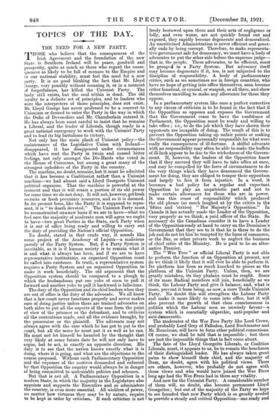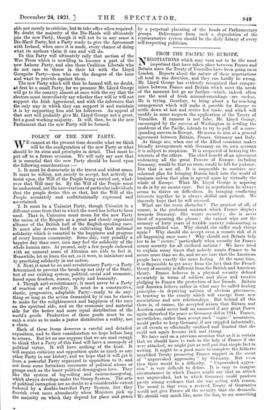TOPICS OF THE DAY.
THE NEED FOR A NEW PARTY.
IIIHOSE who believe that the consequences of the Irish Agreement and the foundation of the new State in Southern Ireland will be peace, goodwill and prosperity, quite as much as those who regard the conse- quences as likely to be full of menace to the Empire and to our national stability, must feel the need for a new party. It is no good blinking the fact that Mr. Lloyd George, very possibly without meaning it, or in a moment of forgetfulness, has killed the Unionist Party. The body still exists, but the soul within is dead. The old loyalty to a definite set of principles, and to leaders who were the interpreters of those principles, does not exist. Mr. Lloyd George has never professed to be a convert to Unionism or desired to enter the Party in the way in which the Duke of Devonshire and Mr. Chamberlain entered it. He has always been most careful to insist that he remains a Liberal, and the leader of Liberals, though ready in a great national emezgency to work with the Unionist Party and to lead its big battalions to victory. Not only has the main plank of Unionist policy—the maintenance of the Legislative Union with Ireland— disappeared, it has disappeared under circumstances which have rent the Party in twain and caused bitter feelings, not only amongst the Die-Hards who voted in the House of Commons, but among a great many of the strongest upholders of the Party in the country. The machine, no doubt, remains, but it must be admitted that it has become a Coalitionist rather than a Unionist machine—we had almost said a Lloyd Georgeite Unionist political organism. That the machine is powerful at the moment and that it will retain a portion of its old power for some time we do not deny. It will not, however, get fresh recruits or fresh pecuniary resources, and so it is doomed. In its present form, like the Party it is supposed to repre- sent, it is " to death devoted." The Unionist Party must be reconstructed on a new basis if we are to have—what we feel sure the majority of moderate men will agree we ought to have—two great Parties in the State, each Party when it is out of office being ready and willing to carry out the duty of providing the Nation's official Opposition. No doubt, stated in that crude way, it sounds like some project of the Academy of Laputa—a malicious parody of the Party System. But, if a Party System is inevitable, as it is if human society is to remain what it is and what it always has been, and if we are to have representative institutions, an organized' Opposition must be called into existence. In truth, a representative system requires a Party System and an organized Opposition to make it work beneficially. The old argument that the Opposition system should be compared to a plough to which the husbandman put one yoke of oxen to pull it forward and another yoke to pull it backward is fallacious. The duty of the Opposition and its chief leaders when they are out of office is the duty of the advocate. We all know that a law-court never functions properly and never makes sure of doing justice unless there are trained advocates on both sides to put all the aspects of the case from the point of view of the prisoner or the defendant, and to criticize all the contentions made, and all the evidence brought, by the prosecutor or the plaintiff. The advocate may not always agree with the case which he has got to put to the court, but all the same he must put it as well as he can. He must not let himself be haunted by the thought that very likely at some future date he will not only have to argue, but to act, in exactly an opposite direction. His duty is to see that the nation knows exactly what it is doing, where it is going, and what are the objections to the course proposed. Without such Parliamentary Opposition and the exposure of the motives demanded and enforced by that Opposition the country would always be in danger of being committed to undesirable policies and schemes. But that is not all. A Parliamentary Opposition in a modern State, in which the majority in the Legislature also appoints and supports the Executive and so administers the country, is even more essential. All wielders of power, no matter how virtuous they may be by nature, require to be kept in order by criticism. If such criticism is not freely bestowed upon them and their acts of negligence or folly, and even worse, are not quickly found out and exposed, they rapidly become degenerate and demoralized. An uncriticized Administration is never efficient and gener- ally ends by being corrupt. Therefore, to make representa- tive government safe for democracy, we must have a body of advocates to put the ether side before the supreme judge— that is, the people. These advocates, to be efficient, must be group( d in a Party System. But advocacy itself may become degenerate if it, too, is not subjected to the discipline of responsibility. A body of parliamentary critics, such as we sometimes see in foreign countries, who have no hope of getting into office themselves, soon become either fanatical, or cynical, or waspish, or all three, and show themselves unwilling to make any allowance for those they oppose.
In a parliamentary system like ours a perfect corrective to any excess of criticism is to be found in the fact that if the Opposition so opposes and exposes the Government that the Government cease to have the confidence of Parliament, the Opposition must be ready and willing to take office ; i.e., to do the job which they have shown their opponents are incapable of doing. The result of this is to prevent the Opposition taking up unfair points or making the Government appear personally responsible for what were really the consequences of ill-fortune. A skilful advocate with no responsibility may often be able to make the buffets of ill-luck appear to be due to the wickedness of tile Govern- ment. If, however, the leaders of the Opposition know that if they succeed they will have to take office at once, and may be compelled by the force of circumstances to do the very things which they have denounced the Govern- ment for doing, they are obliged to temper their opposition and largely to free it from injustice. In a word, it becomes a bad. policy for a regular and expectant Opposition to play an unpatriotic part and not to make certain allowances for those who are in power. It was this sense of responsibility which produced the old phrase (so much laughed at by the critics in the 'fifties and 'sixties) " Her Majesty's Opposition." In Canada it has actually made the Leader of the Opposition, very properly as we think, a paid officer of the State. So necessary do the Canadians consider it to have a Leader of the Opposition ready at hand to carry on the Dominion's Government that they see to it that he is there to do the job and do not let him be tempted by the lures of commerce, or the Bar, or other private work to neglect the business of chief critic of the Ministry. He is paid to be an alter- native Premier.
The " Wee Free " or official Liberal Party is not able to perform the function of an Opposition at present, nor do we think it likely that it will ever be able to perform it. Its platform has been as much knocked to pieces as the platform of the Unionist Party. Unless, then, we are greatly mistaken, its tiny phalanx must be resplit. Some of its more Radical members will join, beneficially as we think, the Labour Party and give it balance, and, what is more, prevent it from being, as now, a mere Trade Unionist Party. No doubt this will strengthen the Labour Party and make it more likely to come into office, but it will also prevent the growth of that class consciousness in politics which the Labour men so unwisely favour—a system which is essentially oligarchic, anti-popular and anti-democratic.
The moderates of the Wee Free Party like Lord Crewe, and probably Lord Grey of Fallodon, Lord Buckmaster and Mr. Runciman, will have to form other political connexions. Of course, we shall be told that is impossible ; but these are just the impossible things that in fact come about.
The fate of the Lloyd Georgeite Liberals, or Coalition Liberals, must, it appears to us, be to remain the henchmen of their distinguished leader. He has always taken great pains to show himself their chief, and the majority of them, no doubt, agree with his political views. There are others, however, who probably do not agree with those views and who would have joined the Wee Frees long ago had the Wee Frees had in them any vitality. And now for the Unionist Party. A considerable number of them will, no doubt, also become permanent Lloyd Georgeites • but out of the majority of the Party we hope to see founded that new Party which is so greatly needed to provide a steady and critical Opposition—one ready and able not merely to criticize, but to take office when required. No doubt the majority of the Die-Hards will ultimately join the new Party, though it will not be in any sense a Die-Hard Party, but a Party ready to give the Agreement with Ireland, when once it is made, every chance of doing what its authors claim it can and will do.
To this Party will ultimately rally that section of the Wee Frees which is unwilling to become a part of the new Labour Party, and also those Coalition Liberals who do not care to throw in their lot with the Lloyd Georgeite Party—men who see the dangers of the hour and want to provide against them. The new Party which will thus be formed will, no doubt, at first be a small Party, for we presume Mr. Lloyd George will go to the country almost at once with the ery that the electors must immediately say whether they will or will not support the Irish Agreement, and with the inference that the only way in which they can support it and maintain it is by supporting him and his followers. An appeal of that sort will probably give Mr. Lloyd George not a great, but a good working majority. It will, then, be in the new Parliament that the new Party will be formed.



































 Previous page
Previous page